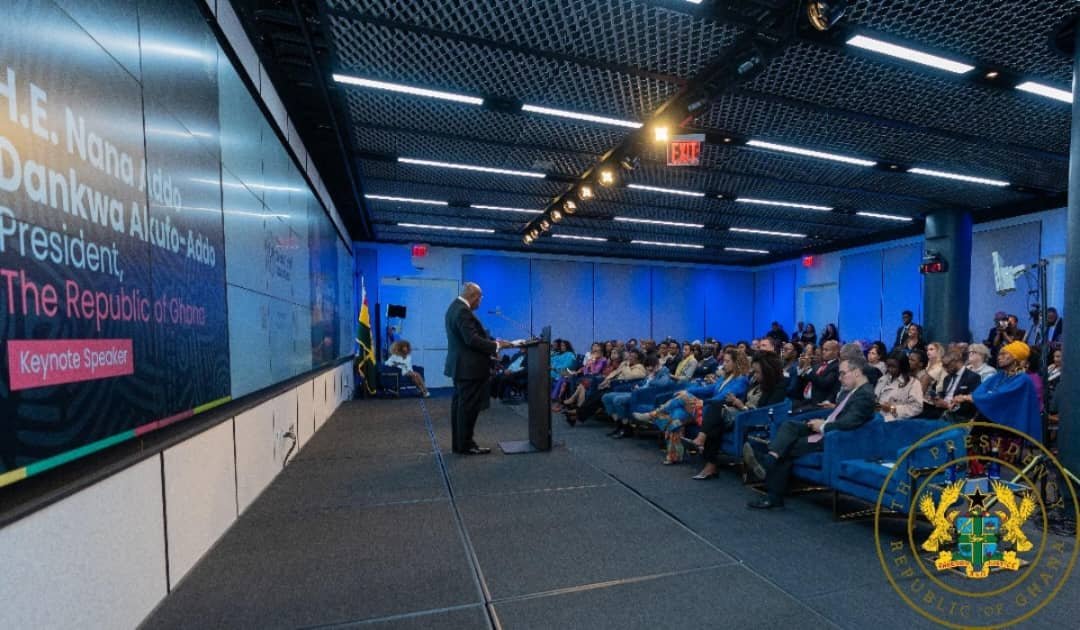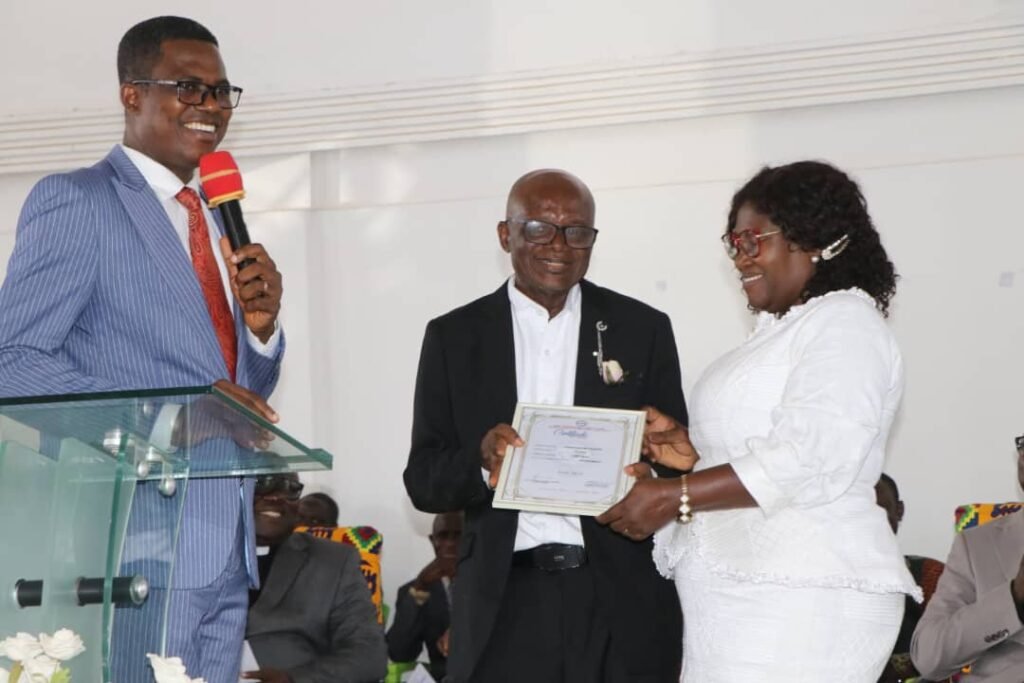News
Righting Historical Wrongs: President Akufo-Addo calls for Reparative Justice at UN Assembly”

At a significant side event during the 2024 UN General Assembly in New York, President Nana Addo Dankwa Akufo-Addo of Ghana delivered a compelling address on reparations, calling for a global reckoning with the historic injustices inflicted on people of African descent.
In his passionate speech, the President outlined the importance of reparative justice, while stressing that this moment in history is not merely about reflecting on past wrongs but about forging a path toward a just and equitable future.
“We are not convening this evening to share words, nor are we merely reflecting on history,” President Akufo-Addo began.
He said, “No, my friends, we are here to envision a new future—a future that corrects the injustices of the past and ensures that our children, and their children, are born into a world that embraces their dignity and humanity.”
In addressing the gathered dignitaries, diplomats, and representatives of African nations and the African diaspora, the President underscored the brutal legacy of slavery, colonialism, and systemic racism that continues to reverberate in the lives of people of African descent.
He emphasized that reparations are not just about compensation but about rebuilding the dignity and future of a people whose humanity was denied for centuries.
Akufo-Addo highlighted the historical examples of Haiti and the United States, where former enslaved peoples were further burdened instead of compensated.
He recounted the harrowing case of Haiti, a nation that was forced to pay reparations to France for the audacity of gaining its independence from colonial rule in 1804.
Haiti was shackled with an unjust debt of $21 billion that crippled its economy and prospects for generations.
“Haiti’s example illustrates a fundamental truth: reparations, when wrongly administered, do not serve justice. Rather, they can reinforce the very power structures that perpetuate dominion and inequality,” President Akufo-Addo asserted.
He added, “It was the enslaved who paid their former slave masters, a story that still resonates across the Global South.”
Akufo-Addo’s address also recounted the injustices perpetrated in the United States and the United Kingdom, where compensation for the abolition of slavery was perversely awarded to the slave masters, rather than to those who had endured years of forced labor and inhumane treatment.
In the United States, $300 was paid to slave owners for each enslaved person they lost, while the enslaved were left with nothing but their hard-won freedom. Similarly, in the UK, £20 million—a figure now equivalent to £20 billion—was paid to former slave owners, but not a penny was awarded to those who had suffered under slavery.
“This was a perverse inversion of justice, one that allowed the structures of inequality to endure long after the formal end of slavery,” Akufo-Addo said, noting the enduring economic disparities and systemic racism that continue to afflict people of African descent to this day.
“But, as Akufo-Addo reiterated, this event was not only about reflecting on these injustices. It was about taking active steps towards creating a future where reparations can be a meaningful part of healing and building sustainable livelihoods for those whose ancestors were wronged,” he said.
At the recent Reparations Conference in Accra, held in November 2023, the groundwork was laid for defining reparative justice for Africa and the African diaspora.
The President outlined several key actions agreed upon at the conference, including the establishment of a global reparations commission, the return of stolen cultural artifacts, and investments in African nations and communities worldwide.
“This is the vision of reparations that we must hold onto—one that looks not only at compensation for past injustices but also at the creation of sustainable, just futures for our people,” the President declared.
The concept of Afro-diplomacy was also central to the President’s speech. Akufo-Addo called on African nations and their diaspora to be the architects of their future, pushing for reparations through global diplomacy, partnerships, and solidarity with other oppressed peoples.
“Reparations will not be handed to us freely—we must actively seek them,” he said, urging the world to see Africans as equals on the global stage, not beggars.
Concluding his remarks, President Akufo-Addo expressed confidence in the youth of today, whom he believes will be the ones to transform global systems and build a future of justice, equality, and empowerment for all Africans.
“My friends, we stand at the threshold of a new world—a world that we must imagine, design, and build. This is the world of reparative futures, a world where the wrongs of the past are righted, and where African nations are free to define their own destinies,” he said.
As the address drew to a close, it was clear that President Akufo-Addo’s vision for reparations is about far more than financial compensation—it is about transforming the very foundations of global justice, ensuring that the descendants of the enslaved can thrive in a future where dignity, respect, and equality are their birthrights.
News
Craze for x’mas shopping: Crowded markets, low patronage

Vendors of food and other wares associated with the Christmas celebration have expressed surprise at the low patronage despite the increased number of visitors to some of the major markets across the capital.
Four days to the celebration(Christmas), the markets are filled with various products ranging from food, clothing, livestock and many other stuff, but according to the vendors, patrons are doing more ‘window’ shopping.




The Spectator on visits to some of the markets in the capital, notably the Odawna, Makola, Accra Central Business District, New Town and others made similar observations as shoppers crowd them but did little in terms of purchases.
The paper also observed that majority of vendors, originally selling other wares have switched to product related to the festive season.
What it means is that there are a lot more clothes, food and vegetables, livestock and poultry, toys, firecrackers, drinks of different types and many others on display.




The markets have also stretched to the pedestrian pavement, leaving very narrow spaces for commuters to move about freely.
That, in addition to a few of the female vendors dressed in coloured attires to reflect the occasion, has heightened the euphoria, leaving the low sales as the only headache for the vendors.
Speaking with this paper, they sounded very optimistic, believing that sales would improve in the last few days to the yuletide.
According to them, there was the opportunity to sell beyond Christmas as the New Year celebration offers similar opportunity to trade the same wares.
They urged patrons to throng the markets to shop since prices were quite moderate and products affordable for all.
News
Retirement service for Elder John Ackom-Asante,3 others

Retired Deputy Editor of The Spectator, Elder John Ackom-Asante, was last Sunday honoured by the Church of Pentecost Windy Hills District in Kasoa in the Central Region, with a retirement thanksgiving service, after serving for 26 year as an Elder of the church.
He was honoured with a citation and certificate of service along with three other elders who served in the capacity for various years.





Elder Ackom-Asante was baptised at the Darkuman Central Assembly in 1979 and ordained as an Elder in 1997.
The citation read “Your selfless service, zeal, willingness to relate wholeheartedly and your desire to effect change has gone a long way to shape the lives of many people in the church and the nation over the 26 years of your dedication to the service of the Lord.”
Elder Ackom- Asante held many positions at the Darkuman Central Assembly, Obuasi in the Ashanti Region and Tema, serving in various capacities as youth and evangelism ministry leader and marriage counsellor.







He was the founding member of the Darkuman Christian Fellowship, a member of the Greater Accra Christian Fellowship; member of Bible Society of Ghana; founding member Obuasi Chapter Full Gospel Businessmen Fellowship International and founding member of New Times Corporation Christian Fellowship and Chaplain, Methodist University Tema Campus 2009- 2010.
As a professional journalist, Elder Ackom-Asante combined effectively and efficiently his duty as a member and elder of the church and the demands of his profession, with admiration from the church, kith and kin, till his retirement on December
From Alhaji Salifu Abdul-Rahaman, Kasoa



